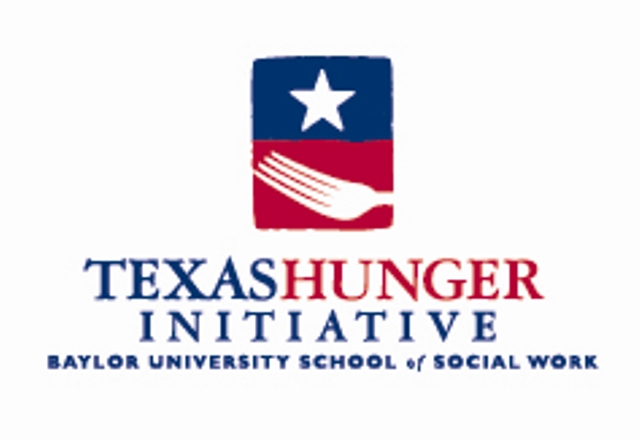Waco Team to Attend Leadership Academy to Address Local Hunger and Poverty

Follow us on Twitter: @BaylorUMediaCom
Media contact: Frank Raczkiewicz , (254) 710-1964
WACO, Texas (May 21, 2013) - The National League of Cities (NLC) has selected Waco as one of 21 cities nationwide to participate in a leadership academy that will help the city reduce childhood hunger by leveraging federal funding.
Kelsey Scherer, child hunger outreach specialist at Baylor University's Texas Hunger Initiative - Waco Regional Office, along with Earl Stinnett, program coordinator for City of Waco Parks and Recreation, and Candace Hayes, community ministries coordinator of Greater Harvest Assembly, make up the team of Waco representatives. The Texas Hunger Initiative is based in the Baylor University School of Social Work.
The academy, co-hosted by the NLC's Institute for Youth, Education, and Families and the Food Research and Action Center, will take place May 22-23 in Denver, Colo., as part of the Cities Combating Hunger through Afterschool and Summer Meal Programs (CHAMPS) initiative. The project is funded by a grant from the Wal-Mart Foundation.
Some 39 cities across the country applied for the opportunity to attend the leadership academy. Waco and Houston were the only two cities chosen from Texas.
For the past few months, Scherer, Stinnett and Hayes have collaborated in applying for the opportunity to attend the CHAMPS leadership academy with hopes to gain the appropriate knowledge and skills to ensure that Waco's city offices, non-profit sector and faith-based organizations are fully utilizing federal reimbursement opportunities, particularly those addressing poverty and hunger.
The effort has united representatives from sectors of the city who don't often cross paths in the work week for the purpose of feeding hungry children in Waco after school hours, according to Scherer.
"We saw this leadership academy as a unique opportunity to bring some new voices to the table, as well as recognizing existing voices." Scherer said. "It's really an important set of key players."
"I look forward to learning to serve on a more diverse level, rather than only with those with whom I am most familiar," Hayes added.
At the academy, representatives from the selected cities will hear from federal nutrition program experts and have the opportunity to learn from other cities' successes, as they discuss experiences and challenges in providing adequate nutrition for local children.
The CHAMPS initiative is designed to help cities increase the number of children receiving healthy meals at afterschool and summer programs by drawing on funding from two sources from the U.S. Department of Agriculture: the Afterschool Meal Program and the Summer Food Service Program (SFSP). This funding provides federal reimbursement to cities, school districts and nonprofits that offer meals to children who participate in meal programs outside of regular school hours. These meals are crucial to children that are a part of families who struggle to put nutritious meals on the table.
Hayes, who will be coordinating a summer meals site for the first time, hopes the partnership will help her engage a wider clientele.
"I look forward to gaining a clear understanding of the local program sites and also to learning more about the NLC and other opportunities that may be available to our city for the purpose of serving those in need," Hayes said. "I believe that many citizens are unaware of the hunger crisis in the U.S. Hopefully, by attending the leadership conference, we will obtain knowledge concerning the hunger dilemma and develop more ways to crack down on it."
As Hayes, Scherer and Stinnett head to Denver, CO, on Wednesday, their hope is that the knowledge they will bring back from the leadership academy will have a direct and positive impact on the city of Waco and its children.
ABOUT BAYLOR UNIVERSITY
Baylor University is a private Christian university and a nationally ranked research institution, characterized as having "high research activity" by the Carnegie Foundation for the Advancement of Teaching. The university provides a vibrant campus community for approximately 15,000 students by blending interdisciplinary research with an international reputation for educational excellence and a faculty commitment to teaching and scholarship. Chartered in 1845 by the Republic of Texas through the efforts of Baptist pioneers, Baylor is the oldest continually operating university in Texas. Located in Waco, Baylor welcomes students from all 50 states and more than 80 countries to study a broad range of degrees among its 11 nationally recognized academic divisions. Baylor sponsors 19 varsity athletic teams and is a founding member of the Big 12 Conference.
ABOUT THE BAYLOR SCHOOL OF SOCIAL WORK
The Baylor University School of Social Work is home to one of the leading graduate social work programs in the nation with a research agenda focused on the integration of faith and practice. Upholding its mission of preparing social workers in a Christian context for worldwide service and leadership, the School offers a baccalaureate degree (BSW), a Master of Social Work (MSW) degree, a PhD degree, and three joint-degree options (MSW/Master of Business Administration, MSW/Master of Divinity and MSW/Master of Theological Studies) through a partnership with Baylor's Hankamer School of Business and George W. Truett Theological Seminary. Visit www.baylor.edu/social_work to learn more.
ABOUT THE TEXAS HUNGER INITIATIVE
The Texas Hunger Initiative (THI) is a capacity-building and collaborative project housed in the Baylor University School of Social Work that seeks to develop and implement strategies to end hunger through policy, education, community organizing and community development. THI seeks to make the state food secure by ensuring that every individual has access to three healthy meals a day, seven days a week. THI convenes federal, state and local government stakeholders with non-profits, faith communities and business leaders to create an efficient system of accountability that increases food security in Texas. There are 12 regional Texas Hunger Initiative offices located across the state.